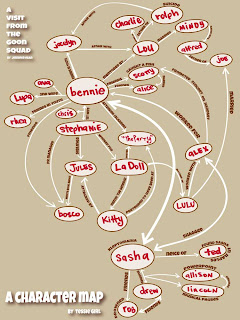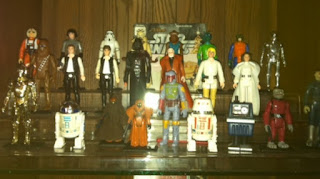Revising Fiction: The Reader
182. Have you forgot your reader?
 The writer-reader relationship may be one of the most complicated - and unforgiving - in the arts. To give you an idea, do a Google search to see how many qutoes line up on the side of the reader being the most important aspect of writing, and then see how many quotes you can find for the exact opposite.
The writer-reader relationship may be one of the most complicated - and unforgiving - in the arts. To give you an idea, do a Google search to see how many qutoes line up on the side of the reader being the most important aspect of writing, and then see how many quotes you can find for the exact opposite.
The truth is, without readers, fiction is nothing. Your reader must be your primary concern, but then at the same time, you have to have a certain ignorance of them. As a writer you need to achieve a couple things in your novel or short story. The first and probably most important is distance. The reader can't be aware of the author as they're reading; if they are, the jig is up and what John Gardner calls 'a vivid and continuous dream' is shattered. Every effect you create within your work has to work towards the goal of making you as the author invisible; you have to work in mysterious ways.
That being said, there's a lot of fiction that is deliberately meta. An excellent example would be one of my favorite shows (and things ever) - the NBC show 'Community.' Dan Harmon has made the show a running commentary on itself, other TV shows and the medium. Part of the audience engagement here is in this communal self-consciousness. The reward is a deeper understanding and appreciation of the medium, and the acrobatic skills of the author; the risk is story.
A prime example of the meta-ness of the show is the picture above. In the background, there's a poster for a fictional show called Inspector Spacetime, which is a spoof of Doctor Who. Inspector Spacetime has taken on a life of its own within the Community - um, community - and has added another lens in which Abed views the world around him. The lenses can be long or deep; the same photo comes from the episode where they parody Glee and Invasion of the Bodysnatchers at the same time. Such acrobatics can be exhilirating, but unsatisfying on a emotional level, if the only thing to invest in is the author's awareness of the story or your own.
David Madden points out in Revising Fiction that between the reader and writer, there has always been 'a secret collusion, collaboration and communion which determines the degree of involvement that is acheived.' This collusion may be conscious or not; it may be willing or not.
Don't get me wrong: I LOVE Community.
Community is not a show that discards its relationship with its audience for the sake of art. The show survives on its characters, but I don't believe it's a show where the characters come first. The emotional and narrative arcs of the characters are mostly background to fairly elaborate executions of genre and meta hat tricks that sometimes only reveal themselves years later. The show struggles to reach a wide audience, and I think it's because the show presents a challenge that many people either aren't willing to able to meet. Most people just want to zone out or have a good laugh after a long day. Where the show may improve is leading with character and getting a buy in from viewers when it comes to the richness the show offers every week.
When you're writing, keep this in mind - a relationship is commitment. It's also compromise. More than anything, a relationship creates trust that then forms the basis for sometimes enormous risk.
 The writer-reader relationship may be one of the most complicated - and unforgiving - in the arts. To give you an idea, do a Google search to see how many qutoes line up on the side of the reader being the most important aspect of writing, and then see how many quotes you can find for the exact opposite.
The writer-reader relationship may be one of the most complicated - and unforgiving - in the arts. To give you an idea, do a Google search to see how many qutoes line up on the side of the reader being the most important aspect of writing, and then see how many quotes you can find for the exact opposite.The truth is, without readers, fiction is nothing. Your reader must be your primary concern, but then at the same time, you have to have a certain ignorance of them. As a writer you need to achieve a couple things in your novel or short story. The first and probably most important is distance. The reader can't be aware of the author as they're reading; if they are, the jig is up and what John Gardner calls 'a vivid and continuous dream' is shattered. Every effect you create within your work has to work towards the goal of making you as the author invisible; you have to work in mysterious ways.
That being said, there's a lot of fiction that is deliberately meta. An excellent example would be one of my favorite shows (and things ever) - the NBC show 'Community.' Dan Harmon has made the show a running commentary on itself, other TV shows and the medium. Part of the audience engagement here is in this communal self-consciousness. The reward is a deeper understanding and appreciation of the medium, and the acrobatic skills of the author; the risk is story.
A prime example of the meta-ness of the show is the picture above. In the background, there's a poster for a fictional show called Inspector Spacetime, which is a spoof of Doctor Who. Inspector Spacetime has taken on a life of its own within the Community - um, community - and has added another lens in which Abed views the world around him. The lenses can be long or deep; the same photo comes from the episode where they parody Glee and Invasion of the Bodysnatchers at the same time. Such acrobatics can be exhilirating, but unsatisfying on a emotional level, if the only thing to invest in is the author's awareness of the story or your own.
David Madden points out in Revising Fiction that between the reader and writer, there has always been 'a secret collusion, collaboration and communion which determines the degree of involvement that is acheived.' This collusion may be conscious or not; it may be willing or not.
Don't get me wrong: I LOVE Community.
Community is not a show that discards its relationship with its audience for the sake of art. The show survives on its characters, but I don't believe it's a show where the characters come first. The emotional and narrative arcs of the characters are mostly background to fairly elaborate executions of genre and meta hat tricks that sometimes only reveal themselves years later. The show struggles to reach a wide audience, and I think it's because the show presents a challenge that many people either aren't willing to able to meet. Most people just want to zone out or have a good laugh after a long day. Where the show may improve is leading with character and getting a buy in from viewers when it comes to the richness the show offers every week.
When you're writing, keep this in mind - a relationship is commitment. It's also compromise. More than anything, a relationship creates trust that then forms the basis for sometimes enormous risk.


Comments